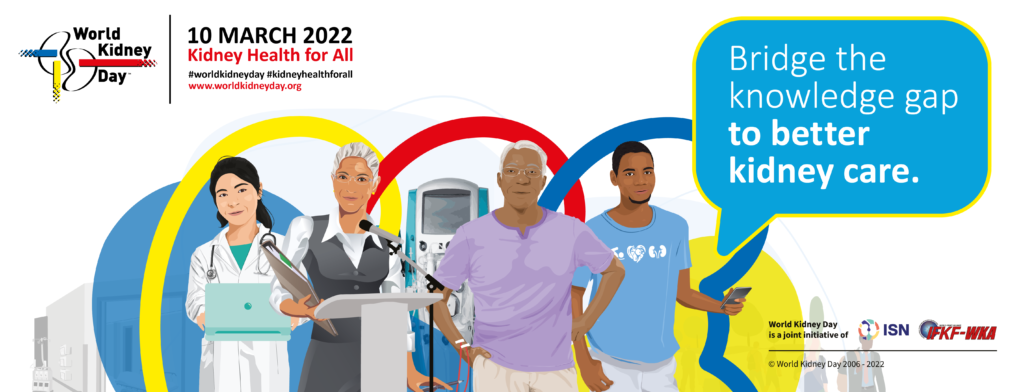
World Kidney Day is a global initiative aimed at raising awareness on the importance of kidney health, and the considerable burden of kidney disease for populations and health systems across the world. More specifically, The objectives of World Kidney Day are to sensitise EU policy makers and the general public about Chronic Kidney Disease (CKD) prevention, treatments and care. Innovative treatments are desperately lacking and inequalities in access to all treatment options, such as kidney transplantation and home-dialysis remain high.
This year’s World Kidney Day theme is “Kidney Health for All”. The campaign calls on all of us to work to bridge knowledge gaps to improve kidney care. The 2022 campaign will focus on efforts to increase education and awareness about kidney health and on reducing the stubbornly high CKD knowledge gap at all levels of kidney care.
On this important day, EKHA worked with key stakeholders and policymakers to express the urgent needs of the kidney community in a series of video statements. One message standing out is that CKD should be included as a priority area in the new EU initiative on Non-Communicable Diseases ‘Healthier Together’.
Currently, 100 million people in Europe suffer from CKD, and it is estimated that by 2040, CKD will be the fifth leading cause of death globally. The overall costs of CKD are estimated at 140 billion euros per year in Europe, and annual reimbursement per country for dialysis, which is the main treatment for advanced kidney disease, can be as high as €80,000 per patient. Including CKD in the EU initiative on NCDs is a necessary step to help reverse this worrying trend. It will be beneficial to both patients and society.
Watch stakeholders video statements for World Kidney Day 2022:
Watch Prof. Em. Raymond Vanholder statement for World Kidney Day 2022
On World Kidney Day 2022, Prof. Em. Raymond Vanholder, EKHA President, explains why he dedicated his life to fighting and raising awareness about kidney disease. In this compelling video, he shares his experience as a nephrologist, researcher, and kidney patients advocate. In 2011, Prof. Em. Vanholder became involved in EKHA with the aim to join forces with other professionals and patients, to improve the recognition of kidney disease in the EU.
Dr Olivier Véran, French Minister for Solidarity and Health, shares his support on World Kidney Day 2022
On World Kidney Day 2022, French Minister for Solidarity and Health, Dr Olivier Véran, expresses, in the context of the French Presidency of the EU, his support for kidney patients and EKHA’s work. In his encouraging message, Dr Véran points to the necessity to step up research for innovative treatments to help improve patients’ quality of life and include CKD in the new EU initiative on NCDs ‘Healthier Together’.
Watch John F. Ryan, Director for Public Health, DG SANTE, Q&A on World Kidney Day
In this Q&A video, John F. Ryan, Director for Public Health at the European Commission, shares the Commission’s approach to Chronic Kidney Disease. Mr Ryan presents the European Union’s initiatives supporting kidney health and World Kidney Day.
MEP Hilde Vautmans calls on EU Commissioners to tackle Chronic Kidney Disease
In this video, MEP Hilde Vautmans, expresses her concerns about the rising burden of Chronic Kidney Disease in the EU and globally. As chair of the MEP Group for Kidney Health, MEP Hilde Vautmans calls on EU Commissioners Stella Kyriakides and Mariya Gabriel to create and implement an EU systematic approach to Chronic Kidney Disease and extend the new EU Initiative on Non-communicable Diseases ‘Healthier Together’ to Chronic Kidney Disease.
MEP Manuel Pizarro calls for bolder action on Chronic Kidney Disease at the EU level
MEP Manuel Pizarro, Co-chair of the MEP Group for Kidney Health, shares a video message on World Kidney Day 2022 theme “Kidney Health for All”. Stressing that without bolder action, Europe will quickly face the consequences of increasing numbers of Chronic Kidney Disease patients, because of rising risk factors. On a policy level, he reiterates his support to extending the EU initiative on Non-Communicable Diseases ‘Healthier Together’ to Chronic Kidney Disease.
MEP César Luena calls for more research and recognition for kidney disease
On World Kidney Day 2022, MEP César Luena, Member of the MEP Group for Kidney Health, reminds us in a video statement of the impact of kidney disease on patients’ quality of life, on the economic sustainability of public health systems and on the environment itself. He highlights the importance of making Chronic Kidney Disease a priority of the Horizon Europe research programme and the European initiative on Non-Communicable diseases “Healthier Together”.
MEP Jutta Paulus expresses her support for an integrated approach to kidney disease
On World Kidney Day 2022, MEP Jutta Paulus, Member of the MEP Group for Kidney Health, shares a video statement calling for an integrated, systematic approach to chronic kidney disease at the European level. She stresses the urgent need for more investment in early diagnosis and screening.
The world needs drastically better Kidney Replacement Therapies
In this concise and informative infographic, learn why current Kidney Replacement Therapies (KRT) are inadequate. On World Kidney Day 2022, together with the European Kidney Patients’ Federation and the American Association of Kidney Patients, we aim to raise awareness about the low quality of life, high costs, and high mortality associated with dialysis. As well as the structural shortages of kidney for transplant, and the risks associated with kidney transplants. Current KRT save lives, but they are not optimal. For this reason, we must bundle the best brains to build better treatment during the Decade of the Kidney™ and beyond!
‘I had never heard of kidney failure, I thought I would die’ Read Marion’s story on World Kidney Day
To mark World Kidney Day, Marion has accepted to share her personal story with EKHA as a kidney transplant patient. Marion was first diagnosed thirty years ago at a time when access to information was scarce. From her dialysis years to the kidney transplant she received and the COVID-19 pandemic, Marion hopes to give policy makers a glimpse of what it means to be a CKD patient in 2022.
Marion’s story
‘I started not feeling well 30 years ago, in 1992. I was pale, had dark eyes and my hair was fatty. I had just started working as an engineer, following very active student years. I quickly received the diagnosis based on blood pressure, urine and blood tests. The tests showed that my kidneys were already severely damaged (25% kidney function). Already for years, I had been sleeping a lot and had enormous cramps in my legs each night. I did not know the function of the kidneys at the time and there was no Google yet. I had never heard of kidney failure. I thought I would die.
I had a rather normal life after the diagnosis but quickly, new problems arose
Following the diagnosis, I stopped eating salty food and started to take medication. I would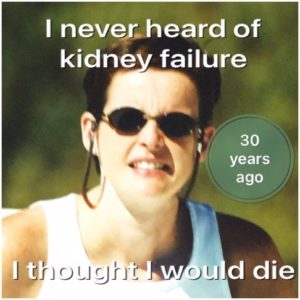 consult the nephrologist 2 or 3 times per year. I had a rather normal life, and a good and fulfilling career. I was very passionate about my work for a European research consortia. I really liked rowing and roller-skating. I would enjoy hiking mountains and discover new cities with friends (and still do!). However, new visible problems rapidly arose: itchy skin, thin cracking nails, chills, flatulence, paleness, fatigue, swollen legs like an elephant, white tongue. I was also advised, based on scientific studies, not to have children. As predicted, after 15 years, my kidney function fell under 15%. I needed Kidney Replacement Therapy. By 2007, I was still working full time but was extremely tired, and would call for perseverance towards my limiting forces. Time moved on and my kidney function fell under 5% by 2009. I was reluctant to involve a living donor, and the two kind hearted offers in my family appeared not to be possible.
consult the nephrologist 2 or 3 times per year. I had a rather normal life, and a good and fulfilling career. I was very passionate about my work for a European research consortia. I really liked rowing and roller-skating. I would enjoy hiking mountains and discover new cities with friends (and still do!). However, new visible problems rapidly arose: itchy skin, thin cracking nails, chills, flatulence, paleness, fatigue, swollen legs like an elephant, white tongue. I was also advised, based on scientific studies, not to have children. As predicted, after 15 years, my kidney function fell under 15%. I needed Kidney Replacement Therapy. By 2007, I was still working full time but was extremely tired, and would call for perseverance towards my limiting forces. Time moved on and my kidney function fell under 5% by 2009. I was reluctant to involve a living donor, and the two kind hearted offers in my family appeared not to be possible.
The treatment was painful, despite my good pain tolerance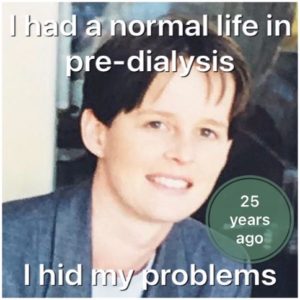
I started dialysis in 2010. I chose home dialysis to have the highest quality of life but I did not have a good vein for a Hemodialysis (HD) shunt. I got a Peritoneal Dialysis (PD) catheter and started PD at home. However, I started going through many difficulties with PD: the PD fluid – some liters – went to my lungs instead of my belly which led to an infection and subsequent hospitalization. The treatment was painful despite my good pain tolerance (ask my friend, I squeezed her hand). I had surgery for temporary HD catheters – as I had no shunt – in thigh veins (femoral) and in neck veins (jugular). But I was starting to worry, because I had no dialysis options left. In the end, my veins were re-evaluated and I got the HD shunt and switched to center based hemodialysis.
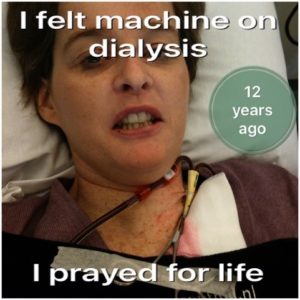 I would have dialysis 156 days per year but it’d still remain unnatural
I would have dialysis 156 days per year but it’d still remain unnatural
I would see the smiling care-givers and friendly dialysis mates each second day at the dialysis center, which would comfort me. I was studying (history, sustainable living) during dialysis but life was challenging: I could not drink anything and would have a very strict food diet. I would always need to motivate myself (or being motivated by my husband) to be active despite the intense fatigue. I was working 10 hours a week and my compassionate colleagues would always encourage me. I was so tired that I could hardly come back home. I was feeling like a man-machine experiment on dialysis: each time, two large needles were pricked in my arm to move my blood from my weak body into a big machine for 4 hours. This would happen 156 days per year but it’d still remain unnatural. I was praying for a better solution.
Transplantation is a joyful moment, like a baby being born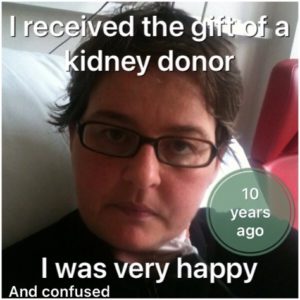
I received the gift of a kidney donor in 2011. I was very happy but also confused because I knew that someone had died. My transplant functioned on 11/11/11, a total reset. By then I produced my own urine, after 2 years of not using the toilets for urine. I immediately had new energy, and the drive of going back to normal. I am still vulnerable though, each time learning a new medical discipline. Here is my list, without the most embarrassing: CMV virus received with the organ, Thrombosis, Pulmonary embolism, Hyperactivity, Head Pressure, Serious wounds due to fatigue, Sleep 11/24 hours, Infections, Skin cancer. But the kidney function is good and stable. I have a good discipline for medication, walking, eating healthy food, hygiene, sufficient water, and most importantly, a positive attitude. I was no longer capable of working in my old function, which ended in 2019.
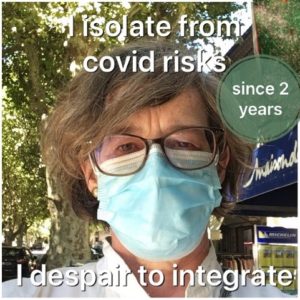 I’m rather positive but after two years of COVID, I wonder how to re-integrate into normal life
I’m rather positive but after two years of COVID, I wonder how to re-integrate into normal life
And then…COVID happened. I have been self-isolating since March 2020 because of the risk for my health. A French study shows that kidney transplant patients have a 30-fold increased risk to be hospitalized and die of COVID. I live alone in an appartement in the nature and my husband lives and works in Paris. I`m rather positive, because life is calmer and I did things which I always wanted to do. I learned about flora, I am active in kidney patient associations, I live a healthy life (and lost 10 kg), I did a foot/posture training, etc. But after 2 years, I wonder (despair) how I can re-integrate into normal life. I am an exception with my positive attitude but for CKD patients in general it has been and remains a very difficult time. Transplant patients still keep their children home from school as the likely alternative is a dead parent. Transplant persons who need and want to work have low protection possibilities. Not to mention that new transplant are still postponed.
I benefit from good medical care and I am very thankful to Europe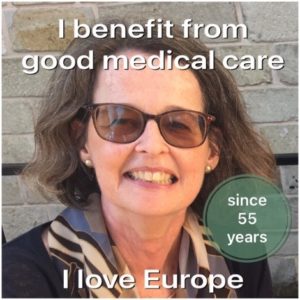
I trust that I will celebrate the 11 years’ anniversary of my kidney transplant at the end of this year. My life expectancy is shorter than healthy people. My driver is: ‘Enjoy the Mystery Of Life & Evolve the Misery To Survive’. I am both confused and happy that I am still here. Over the past 10 years, 10 close persons of my age died, often very unexpectedly (3 friends, 3 cousins, 4 colleagues who gave me attention for my situation). 3 dialysis mates passed away at respectable ages. I am sharing this to encourage positive attitudes. I want to tell people: ‘Look at what you have and what you can do, it is abundant. Manage your own situation, positively without complaining and without leaning on your friends or family, and always with respect’. Despite the challenges, I benefit from good medical care and I am very thankful to Europe.’
Living fully with Chronic Kidney Disease / Vivre pleinement avec une Maladie Rénale Chronique
Watch the Kidney Week special TV programme produced by the Francophone Nephrology, Dialysis, and Transplantation Society (SFNDT) / Regardez l’émission TV spéciale semaine du rein réalisée par la Société Francophone de Néphrologie, Dialyse et Transplantation (SFNDT) : here.
